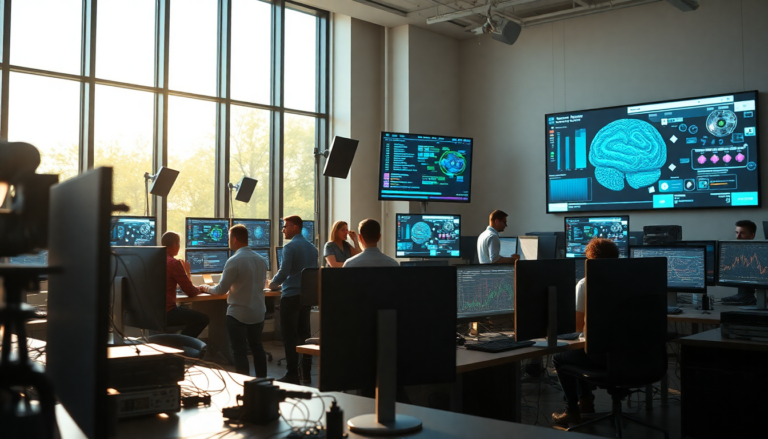Argomenti trattati
Artificial Intelligence is making waves across the entertainment industry, influencing everything from filmmaking to video game development and music production. As AI technology continues to advance, it prompts important discussions about creativity, authorship, and the ethical implications of using machine-generated content. What does this mean for the future of storytelling and artistry?
The rise of AI in Hollywood
It feels like just yesterday when social media exploded with excitement over the capabilities of AI tools like OpenAI’s DALL·E. As users competed to create the most imaginative prompts, a deeper conversation began to emerge: how will AI impact our daily lives and creative processes? Fast forward to today, and we find ourselves at a pivotal moment where AI’s integration into the entertainment industry has become undeniable. Starting in 2025, films that utilize AI technology are eligible for Oscar nominations, a decision that has sparked mixed reactions.
While some celebrate this bold move towards innovation, others argue that it compromises the human touch essential to filmmaking. The film The Brutalist serves as a recent case study where AI helped refine dialogue, showcasing both technical prowess and creative unease. As AI continues to weave itself into the fabric of cinematic storytelling, we must grapple with the reality of creativity no longer being the sole province of humans.
Digital resurrection and the future of actors
The conversation around AI isn’t new. One of the earliest instances of digital resurrection occurred in 1994 with The Crow, which utilized body doubles and digital effects after Brandon Lee’s tragic passing. However, the first fully digital revival came in 2016 with Rogue One: A Star Wars Story, where Peter Cushing’s character was recreated through a blend of CGI and motion capture. This groundbreaking moment opened floodgates for deepfake technology and AI-driven performance recreation.
Fast forward to the present, and we witness the surprising return of Luke Skywalker in The Mandalorian. Instead of recording new lines, Mark Hamill’s voice was meticulously recreated using AI technology, illustrating both the potential and the ethical complexities of using AI in place of human actors. Such advancements raise questions about consent and the ownership of digital likenesses, especially as studios like Disney explore AI-driven projects.
AI’s impact on gaming
As we shift our focus to gaming, the landscape is equally transformative. The pandemic initially spurred a surge in game development and player engagement; however, this boom was short-lived, leading to layoffs and restructuring within the industry. Companies like Nvidia, Ubisoft, and EA are increasingly leaning on AI as a solution to these challenges, redesigning their production processes to incorporate AI-driven automation.
The implications for game developers and voice actors are profound. With AI enhancing NPC behavior and voice acting, development is becoming faster and more cost-effective, yet this trend has left many actors and developers concerned about their futures. Even indie developers are exploring AI options to replicate celebrity voices, but the legalities surrounding this practice remain murky. As the gaming industry navigates this new terrain, creators are faced with the dual challenge of innovation and ethical responsibility.
AI in music production
Music production is also undergoing a significant transformation thanks to AI. Recent surveys indicate that nearly 25% of music producers are now integrating AI tools into their workflows, showcasing a shift in how technology influences composition and performance. Artists like Imogen Heap have embraced this change, creating AI versions of themselves that can generate music and interact with fans—challenging our understanding of creativity.
Major record labels are experimenting with AI as well, with Universal Music reimagining classic tracks using AI technology, effectively expanding cultural reach while preserving the essence of the original works. However, as AI becomes more prevalent in the music industry, the line between innovation and exploitation blurs, prompting critical conversations about the future of human artistry.
The ethical landscape of AI
As AI continues to reshape entertainment across various sectors, the ethical implications surrounding its use become increasingly pressing. Concerns about authenticity, consent, and the commodification of artistry are at the forefront of discussions among creators and audiences alike. In 2023, organizations like SAG-AFTRA began advocating for tighter legal protections for performers, highlighting the need for clear guidelines in the evolving landscape of AI-generated content.
While some instances of AI usage have been celebrated for their respect towards the original artists, such as CD Projekt Red’s recreation of Miłogost Reczek’s voice in Cyberpunk 2077: Phantom Liberty, others have faced backlash. The planned use of a fully CGI-generated James Dean in Finding Jack sparked significant controversy, with critics emphasizing the need for consent and the potential reduction of artists to mere assets.
As we stand on the brink of a new era in entertainment, the conversation around AI is far from over. The choices made by the industry and its audiences will shape the future of storytelling and artistry. Will AI serve as a tool for creative expansion, or will it threaten the very essence of what it means to be a creator? Only time will tell.

